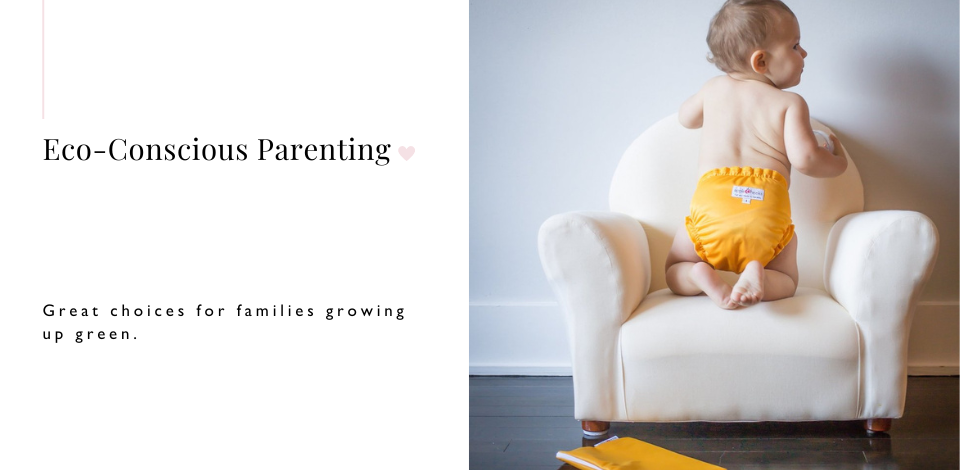Eco-Conscious Parenting
Jump to Section

If you’re like us, you may not have been as concerned with eco-friendly products until you had kiddos. Something about bringing a life into the world puts an extra weight on our shoulders to make safer and healthier choices for them and for the earth they’ll call home long after we’re gone. Of course, every parent’s journey is unique, and not every eco-friendly choice will work for your family, but if you’re looking to make some changes in your home or in the products you use, we’d love to help!
Any parent of a newborn can tell you how much waste a baby produces – we're talking about garbage, not bodily waste, though that’s certainly true too! If you’re looking to cut back on their ecological footprint, especially in the early years, there are tons of ways.
Cloth Diapering
Cloth diapering can be intimidating at first, but it doesn't take long to get the hang of it. Consider trying a set like the Apple Cheeks cloth diapers, to see if it's right for you. One way to get your feet wet would be to buy a small set of cloth diapers (such as an Apple Cheeks starter kit) to try and commit to using them for a month.
If after a month, you’re still not into it, try an eco-friendly brand of disposables such as Honest Company instead. If you discover that this diapering style works for you, buy 6-12 more and start doing it full-time. You could also cloth diaper part-time, and use disposables when you’re out of the house, at night, or if you just haven’t had a chance to wash a load of cloth diapers yet.
In any capacity, cutting back on disposable diaper use is a major way to love the earth and limit waste. If you’re considering using cloth diapers, know that it’s not much different than regular diapers aside from the extra load of laundry every couple of days and an extra minute of clean up for dirty diapers.
There are flushable liners you can put in the diaper to catch solid waste which makes cleanup a lot easier, but let’s be honest, like changing any dirty diaper, it’s gross. Cloth diapers will not only save your family thousands of dollars, but they’re completely waste-free aside from wipes (and you could always use eco-friendly wipes, too!).
To learn more about cloth diapering, click here.
FRESH & ECO-FRIENDLY
Homemade Baby Food & Breastfeeding
Breastfeeding, when you’re able, is an amazing way to nourish your child completely free of environmental impact. There’s no need to buy formula or bottles or the packaging associated with both. If you do bottle feed, glass bottles are preferable to plastic as they can be recycled when you’re finished bottle feeding.
Once baby starts on solid foods, try your hand at homemade baby purees. Using seasonal, healthy produce, you can steam and blend their meal as you’re preparing your own.
When it’s time to incorporate meat, the same rules apply. Whatever protein you’re preparing for the rest of the family can be properly cooked and then blended to satisfy even the youngest diners. We love how this type of meal preparation and enjoyment encourages family meals together, seasonal eating, and introduces children to healthy, real food from a young age.
Eco-Friendly Products
As parents, the safety of our children is our number one concern, so it will comfort you to know that the vast majority of eco-friendly products are also the safest for baby. Baby’s safety is primary but the happy coincidence is that our earth is not harmed by these products either.
For bath time, check out Jack ‘n Jill, Honest Company, and Aleva Naturals are also great.
Aleva Naturals and Honest Company also make great eco-friendly products for cleaning your home. The laundry detergent is especially useful if you’re a cloth diapering family because you can use the same soap for your diapers as you do for the rest of your clothing.
IT'S THE LITTLE THINGS
Growing Up Green
At the end of the day, raising a child to be eco-conscious is more than buying a few products; it’s a lifestyle. Practice recycling and composting, bring your own bags to the grocery store instead of accumulating more plastic ones that you don’t need, and bike or walk instead of driving, if possible. There are so many ways your family can have a positive impact on the earth, and as they grow, your children can contribute to this goal more and more.






